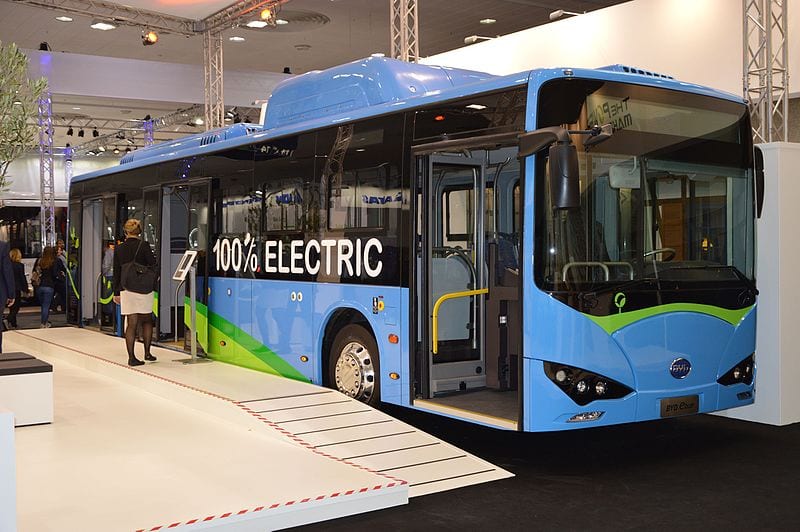In less than 20 years, Chinese firm BYD has gone from non-existent to spearheading China’s push into the global electric vehicle market. With unrelenting development, BYD has successfully transferred from the mobile battery segment, which fuelled its growth initially, to vehicle batteries, and then to electric vehicles altogether. A growth spurt which has not come without problems, but which BYD plans to extend.
Founder and CEO Wuang Chanfu started the business in 1995, after serving in the Chinese People’s Liberation Army, as a government researcher, and quickly turned to the private sector. Seizing the opportunity of the burgeoning mobile phone market to produce phone batteries, the least one could say is that he has come a long way since – he was designated as China’s richest man in 2009. The two main jumps in the track record of BYD came with the second generation of mobile phones (with the notoriously power-hungry smartphones) and the investment of Berkshire Hathaway (Warren Buffet’s development fund). Nowadays, BYD has expanded into the electric vehicle battery department, and has started producing its own vehicles (private vehicles, buses and industrial vehicles), which sell in China, Africa and South America. Over the past decade, the Chinese firm has received accolades from Bloomberg Businessweek, Fast Company and PV magazine for its progress and development.
BYD, which has opened a whole new growth segment with its arrival on the electric vehicle market, has scored a few remarkable hits, for such a young company. Italy has proven a promising market for BYD, with several consecutive sales across the country, as reported by BYD itself: “The tender won by BYD is the first for new generation electric buses in southern Italy. Earlier this year Turin, also placed an order for 13 midibuses. They are soon to be delivered to the northern city.” September saw the sale of a small 7-strong fleet of electric buses to Jerusalem, covered by EV specialist Kyle Field: “The 7-bus order confirms a tender that BYD won in 2016 and builds on the 17 buses BYD provided to the port city of Haifa in northern Israel […] BYD’s more than 23 years of experience in batteries backs up its industry-leading warranty that gives buyers more confidence in what, for most buyers, represents a completely new type of vehicle.” All in all, BYD has successfully participated in 50 municipal transport tenders, making it a promising, if not yet major, player in the game.
BYD has based its growth strategy on two main stilts: government support and US investment. The first is common to just about any successful company in China. The level of penetration of the Chinese State into its own economic fabric makes it safe to say that no company would ever make it close to the top segment of its market without tight cooperation with the authorities. No doubt has the governmental network of Wuang Chanfu helped in this matter, and the CEO can presumably expect the continued support of his government in his industrial development. As for US investment, Warren Buffet struck it big, by investing into the Chinese future giant, as the initial investment has been multiplied by six, in barely ten years. Bloomberg analyst Lee Miller writes: “On Sept. 26, 2008, Berkshire Hathaway Inc. agreed to buy what is now equivalent to 24.59 percent of BYD Co.’s Hong Kong-traded stock. Those shares in what is now China’s biggest maker of alternative-energy vehicles have soared more than 500 percent since then, turning a $232 million investment into a stake worth roughly $1.6 billion at current prices.” BYD can therefore, in all likelihood, expect continued support by its stockholder, after such stellar results. But challenges also lie on the way to market leadership, and BYD will need to carefully think its strategy through, in order to consolidate its position.
The main challenge on BYD’s plate lies in the consolidated capacity to reach the consistent quality levels which customers in developed countries will expect – a market segment in which BYD has run into trouble. Deliveries were unsatisfactory in several high-profile deals, such as the Los Angeles electric-bus fleet. LA-based reporter Angie Schmitt wrote: “There were a number of design problems. But most notable was the range. The buses were only traveling 177 miles between charges. BYD had promised 250, Mayor Tim Keller told the Albuquerque Journal. The issue will delay the project for as much as 18 months. There have been similar problems with buses from the same manufacturer in Los Angeles.” Albuquerque (NM) is also cancelling its cooperation with BYD, due to quality problems, as are many other American cities. Paris ruled out BYD as a contender even before the bid for the eBus fleet was launched. With range (linked to battery performance) at fault in most cases, the Chinese Firm will need to rebuild its credibility on its historical market before it can start consistently standing a chance on major deals. Until then, it will have to maintain its current strategy of fuelling development with smaller deals, in developing countries.
No such growth spurt comes without stretch marks and, despite its size, BYD is still a young company. It therefore makes sense that streamlining and quality still be necessary for BYD to achieve its full potential. But if BYD can maintain its current commercial aggressiveness, successfully adapt its growth strategy to the new era, maintain its economic and current support, and fix its quality problems, then it has a good chance of making it to the top of the global market, not just of China’s.
